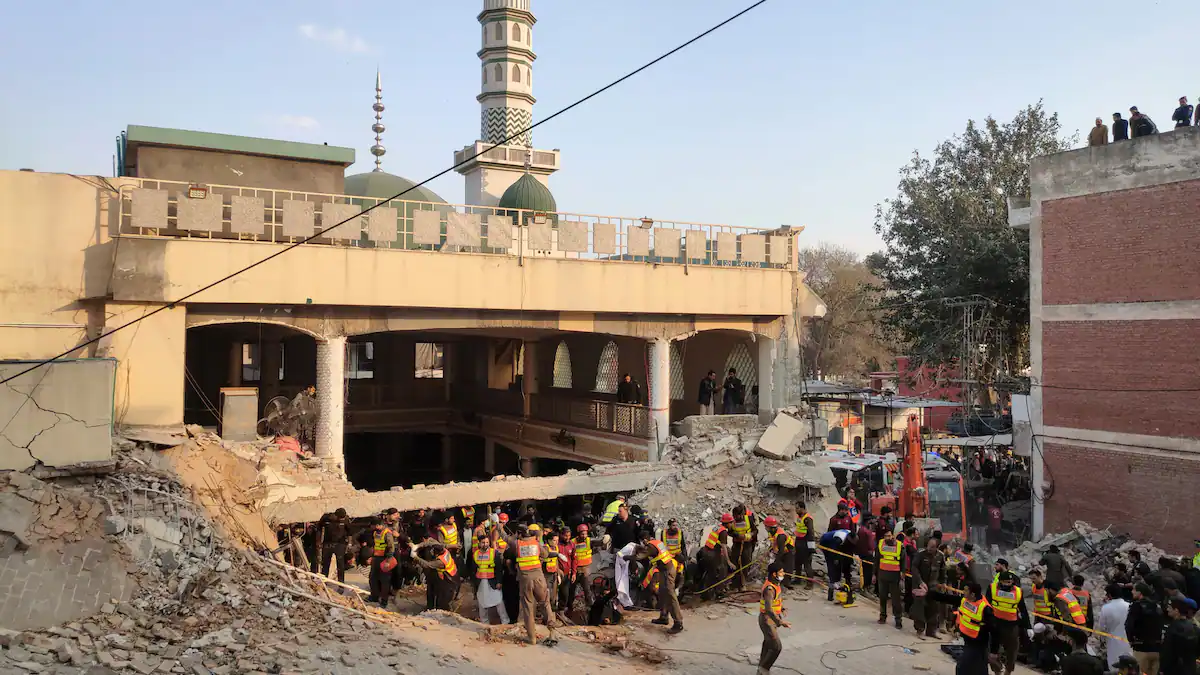PESHAWAR: The death toll in the suicide bombing in the northwestern Pakistani city of Peshawar rose to 83 while at least 157 people were injured, several of them critically, a hospital spokesperson said on Tuesday.
A suicide bomber blew himself up inside a crowded mosque in a highly fortified security compound in Pakistan on Monday, the latest in a string of attacks targeting police.
Police said the attacker appeared to have passed through several barricades manned by security forces to get into the Red Zone compound that houses police and counter-terrorism offices in the northwestern city of Peshawar.
“It was a suicide bombing,” Peshawar police chief Muhammad Ijaz Khan said.
Authorities said the bomber detonated the explosives at the moment hundreds of people lined up to pray. “We have found traces of explosives,” Khan said.
A security lapse had clearly occurred as the bomber had slipped through the most secure area of the compound, he said.
An inquiry was under way into how the attacker breached such an elite security cordon and whether there was any inside help.
Khan said the mosque hall was packed with up to 400 worshippers, and that most of the dead were police officers.
Peshawar district administrator Riaz Mehsud told Arab News: “I think 90 percent of the casualties are police personnel because most of those offering prayers in the mosque were policemen.”
Defence Minister Khawaja Asif said the bomber was standing in the first row of worshippers. Ahmad Khan, a police constable who was inside the mosque when the bomb went off, said the roof collapsed after the explosion. “It was the time for Zuhr prayers,” Khan said. “I was in the second row among worshippers when the blast took place. The roof of the mosque collapsed with many worshippers trapped but I managed to come out with small injuries.”
Another injured police officer, Mushtaq Khan, said: “We couldn’t figure out what happened as the bang was deafening. It threw me out of the veranda. The walls and roof fell on me. Thanks to God, he saved me.”
Witnesses described chaotic scenes as the police and rescuers scrambled to rush the wounded to hospitals.The explosion brought down the upper storey of the mosque, trapping dozens of worshippers in the rubble. Live TV footage showed rescuers cutting through the collapsed rooftop to make their way down and tend to victims caught in the wreckage. “We can’t say how many are still under it,” said provincial governor Haji Ghulam Ali.
Taliban commander claims attack
Sarbakaf Mohmand, a commander for the Pakistani Taliban, also known as Tehreek-e-Taliban Pakistan or TTP, claimed responsibility for the attack in a post on Twitter.
But hours later, TTP spokesperson Mohammad Khurasani distanced the group from the bombing, saying it was not its policy to target mosques, seminaries and religious places, adding that those taking part in such acts could face punitive action under TTP’s policy. His statement did not address why a TTP commander had claimed responsibility for the bombing.
Peshawar is the capital of Khyber Pakhtunkhwa province, where the Pakistani Taliban have a strong presence, and the city has been the scene of frequent militant attacks.
Attacks have been on the rise since last November when the group called off a ceasefire signed with the government in May. Monday’s attack was the worst in Peshawar since March 2022 when a Daesh suicide bombing killed at least 58 people in a mosque during Friday prayers.
‘Unimaginable’
Pakistan Prime Minister Shehbaz Sharif said: “The sheer scale of the human tragedy is unimaginable. This is no less than an attack on Pakistan. The nation is overwhelmed by a deep sense of grief. I have no doubt terrorism is our foremost national security challenge.”
The US embassy in Pakistan expressed “deepest condolences to the families and loved ones of the victims of the horrific attack.”
Sharif urged people, especially followers of his Pakistan Muslim League-Nawaz ruling party, to donate blood to those injured in the attack.
“Reach Lady Reading Hospital, Peshawar, and contribute to saving precious human lives,” he tweeted.
“Terrorists are making a sinister attempt to create an atmosphere of fear and terror by attacking the institutions responsible for the defense of Pakistan, which will be thwarted by the strength of the unity of the state and the people,” the PM was quoted as saying in a statement from Peshawar.
“Pakistan has made great sacrifices against terrorism, we will not let the sacrifices of martyrs go in vain,” the PM added, promising that the capacity and efficiency of anti-terrorist institutions and police would be enhanced.
“It was the time for Zuhr (afternoon) prayers,” police constable Ahmad Khan. “I was in the second row among worshippers when the blast took place. The roof of the mosque collapsed with many worshippers trapped but I managed to come out with small injuries.”
Many were injured when the roof came down, according to Zafar Khan, a police officer, and rescuers had to remove mounds of debris to reach worshippers still trapped under the rubble.
Meena Gul, who was in the mosque when the bomb went off, said he doesn’t know how he survived unhurt. The 38-year-old police officer said he heard cries and screams after the blast.
Police official Siddique Khan the bomber blew himself up while among the worshippers.
Senior police and government officials attended the funerals of 30 police officers and arrangements to bury the rest were being made. Coffins were wrapped in the Pakistani flag their bodies were later handed over to relatives for burials.
Surge in attacks
Pakistan, which is mostly Sunni Muslim, has seen a surge in militant attacks since November, when the Pakistani Taliban ended their cease-fire with government forces.
Earlier this month, the Pakistani Taliban claimed one of its members shot and killed two intelligence officers, including the director of the counterterrorism wing of the country’s military-based spy agency Inter-Services Intelligence. Security officials said Monday the gunman was traced and killed in a shootout in the northwest near the Afghan border.
The TTP is separate from but a close ally of the Afghan Taliban. The TTP has waged an insurgency in Pakistan in the past 15 years, seeking stricter enforcement of Islamic laws, the release of its members in government custody and a reduction in the Pakistani military presence in areas of Khyber Pakhtunkhwa province it has long used as its base.
The Afghan Taliban seized power in neighboring Afghanistan in August 2021 as US and NATO troops pulled out of the country after 20 years of war.
The Pakistani government’s truce with the TTP ended as the country was still contending with unprecedented flooding that killed 1,739 people, destroyed more than 2 million homes, and at one point submerged as much as a third of the country.022.
Afghanistan’s Foreign Ministry said in a statement that it was “saddened to learn that numerous people lost their lives and many others were injured by an explosion at a mosque in Peshawar” and condemned attacks on worshippers as contrary to the teachings of Islam.
Worldwide condemnations
Condemnations also came from the Saudi Embassy in Islamabad, as well as the US Embassy, adding that “The United States stands with Pakistan in condemning all forms of terrorism.”
UN Secretary-General Antonio Guterres called the bombing “particularly abhorrent” for targeting a place of worship, UN spokesman Stephane Dujarric said.
Cash-strapped Pakistan faces a severe economic crisis and is seeking a crucial installment of $1.1 billion from the International Monetary Fund — part of its $6 billion bailout package — to avoid default. Talks with the IMF on reviving the bailout have stalled in the past months.
Former Pakistani Prime Minister Imran Khan called the bombing a “terrorist suicide attack.” He tweeted: “My prayers & condolences go to victims families. It is imperative we improve our intelligence gathering & properly equip our police forces to combat the growing threat of terrorism.”
Sharif’s government came to power in April after Khan was ousted in a no-confidence vote in Parliament. Khan has since campaigned for early elections, claiming his ouster was illegal and part of a plot backed by the United States. Washington and Sharif dismiss Khan’s claims.
Source: Agencies





